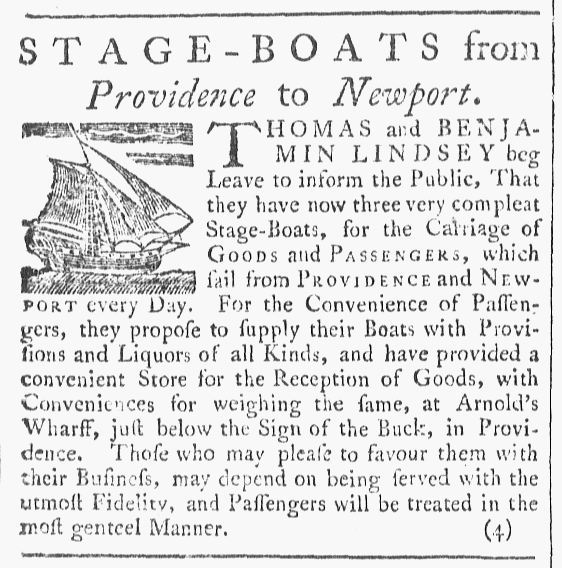What was advertised in a colonial American newspaper 250 years ago today?

“Three very compleat Stage-Boats, for the Carriage of GOODS and PASSENGERS.”
In the late 1760s, Thomas Lindsey and Benjamin Lindsey frequently advertised their ferry service or “STAGE-BOATS from Providence to Newport” in the Providence Gazette, sometimes directly competing with advertisements inserted by Joshua Hacker. That competition may have inspired the Lindseys to provide additional services and market them in their notices aimed at potential customers. In November 1767, Hacker had upstaged them when he published a list of prices and promoted several services he provided gratis, including storage of goods at his warehouse until they were ready for shipment. The Lindseys’ advertisement that ran at the same time much more briefly promised “excellent Accommodations for Passengers.”
In their subsequent advertisement, however, the Lindseys elaborated on the sort of experience travelers could expect on their “very compleat Stage-Boats.” As a convenience for their passengers, they “supply their Boats with Provisions and Liquors of all Kinds” to make the journey more enjoyable. Furthermore, they also pledged that “Passengers will be treated in the most genteel Manner.” In addition, the Lindseys augmented their schedule, sailing between Providence and Newport “every Day” instead of “twice a Week” as they had done just a couple of months earlier. In that regard, they now matched Hacker’s itinerary, making their schedule just as convenient for prospective clients. For customers who wished to ship commodities, they now offered “a convenient Store for the Reception of Goods, with Conveniences for weighing the same, at Arnold’s Wharff.” Again, their services matched those Hacker previously outlined in his advertisement.
The differences between the Lindseys’ advertisements published in November 1767 and January 1768 suggest that they determined that they needed to augment their services if they wanted to compete with Hacker. Yet improving their services was not sufficient: they also needed to market them in the public prints lest Hacker become the preferred carrier of passengers and goods between the two ports by default. They did not want potential clients to gain the impression Hacker offered superior services based on the more extensive advertising campaign he previously launched. The Lindseys may have considered their expanded services and expanded advertisement necessary to maintain and improve their position in the marketplace, especially if they felt they previously had been at a deficit that resulted from Hacker besting their advertisements with his own.

